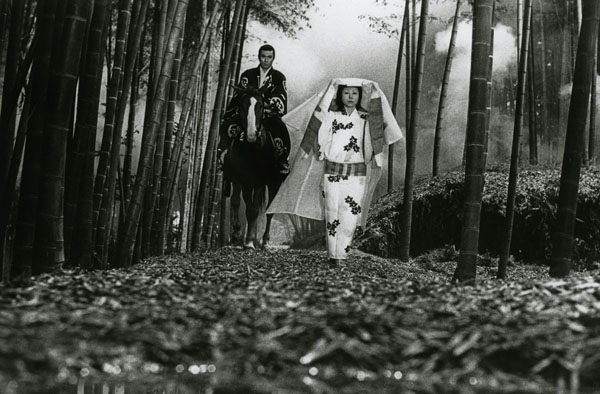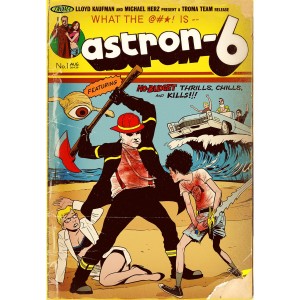
A scene from KURONEKO (Criterion Collection)
We all know that countless titles are released for the home video market every year—in the genre category alone there’s too much for any individual to track, including me. Or should I say “especially me” as I tend to focus my energies on theatrical releases. So just in case you’re like me, here are some gems that might have been easy to overlook, but, looking back, definitely represent highlights of 2011 in terms of horror, fantasy, and science fiction. (And if you’re aiming to redeem any gift certificates this holiday season, these might make great presents for yourself.)
Santa Sangre (Severin Films): Released early in the year, this two-disc set might have been difficult to recall at this late stage if it weren’t for its incredible generosity. Director Alejandro Jodorowsky is famous for being a cult director whose film output has been limited, thus making his fan base (a group to which I belong) salivate pretty much whenever any cinematic scraps are tossed to it. That said, Severin clearly exceeded any reasonable expectations of what might constitute a “definitive” packaging of his 1989 shocker. We can hear the writer-director hold forth on other filmmakers, check out a background documentary on the real-life killer who inspired the film, and even a short made by Jodorowsky’s son (who, as a child actor, plays a key role in his father’s work). And Santa Sangre itself? It’s sometimes criticized as the most commercial of Jodorowsky’s films. Yes, it’s more accessible, and the result is both an art film for horror hounds and a splatter flick for the avant-garde crowd. Sure, influences ranging from Freaks to Hitchcock/De Palma-style gender games are evident here, but Jodorowsky works them over with a psychosexual magic all his own. (Incidentally, it’s a bit odd, but one of my favorite DVDs of 2010 was the similarly circus-themed Vampire Circus , released by Synapse… but there you go.)
Kuroneko (Criterion Collection): Kaneto Shindo’s unforgettable film (often called Black Cat) provides further proof that the year 1968, which also saw the debut of Rosemary’s Baby and Witchfinder General, was a high-water mark for international horror. On the surface, this is a relatively straightforward “vengeful ghost” picture that might be considered a bridge between classics, such as Ugetsu, and the J-horror of today. Yet the issues it raises related to the price of social-climbing, familial loyalty, and perpetual war (the opening, dialogue-less sequence is beyond brutal) lend Kuroneko a layered richness that invites multiple viewings. Add to this the mesmerizingly evocative black-and-white cinematography, some marvelously disorienting editing, and a neat blurring of interior and exterior locations that have psychological overtones, and you’ve got nothing less than a classic. So why isn’t this as well known as Masaki Kobayashi’s Kwaidan? That’s a question the always-insightful Maitland McDonagh addresses in an essay that’s included here. Other disc features provide a wealth of information about Shindo and the era of filmmaking to which he contributed. Indeed, the hour-long interview with the filmmaker, in which he describes how, during the war, scripts were used for toilet paper due to their softness, is nearly worth the price of the DVD by itself.
 Astron-6 (Troma): Easily my favorite DVD release of the year. Why? Quite simply because it does a great job at something for which the format is ideal—compiling disparate materials that would otherwise never be found in one place, certainly not in any theater. That’s because this is a two-disc smorgasbord of short films by a group of some of the most talented genre-oriented practitioners working today. And although the five-man collective has since moved on to make features, this DVD is not of mere historical interest. Sampling these shorts is akin to browsing through a deluxe box of chocolates made out of, um, brilliance. The video quality is not sparkling in all of them, but that’s largely beside the point. The parodies of ’80s action and science-fiction fare are spot-on (Astron-6 excels at faux trailers), and the straight-up horror pieces verge much closer to a disturbing brand of surrealism than any kind of facile horror-comedy. Truly not to be missed.
Astron-6 (Troma): Easily my favorite DVD release of the year. Why? Quite simply because it does a great job at something for which the format is ideal—compiling disparate materials that would otherwise never be found in one place, certainly not in any theater. That’s because this is a two-disc smorgasbord of short films by a group of some of the most talented genre-oriented practitioners working today. And although the five-man collective has since moved on to make features, this DVD is not of mere historical interest. Sampling these shorts is akin to browsing through a deluxe box of chocolates made out of, um, brilliance. The video quality is not sparkling in all of them, but that’s largely beside the point. The parodies of ’80s action and science-fiction fare are spot-on (Astron-6 excels at faux trailers), and the straight-up horror pieces verge much closer to a disturbing brand of surrealism than any kind of facile horror-comedy. Truly not to be missed.
Intruder (Synapse Films): In the last few months of the year, Synapse did a bang-up job of releasing a trio of films all hailing from the 1988-1990 period when grindhouses were in their sunset years: Maniac Cop, Frankenhooker, and Intruder. I’m focusing on this last one because it’s so clearly a kind of unsung landmark of its subgenre, the slasher film, and because the DVD/Blu-ray combo pack manages to present a satisfyingly wide range of unearthed goodies. Audition footage? Extended sequences from the work print? An audio commentary with writer-director Scott Spiegel and Lawrence Bender (who famously went on to work with Tarantino)? Yep, there’s all that here, and more. Of course, none of these extras would merit much interest if the film itself wasn’t worthwhile, but that’s the clincher. Intruder is inventive as pure cinema every step of the way, with Spiegel and crew refusing to take the easy way out. Look for the Raimi brothers in roles as supermarket employees (the use of this setting is highly creative) and for a gore quotient that’s nothing less than flamboyant. Strangely, though, everything feels as if it’s it done in good fun, without an ounce of real meanness. In sum, a revelation that should be considered a must-see for horror fans.

Matt Smith as Doctor Who in episode 1 (BBC Worldwide)
Doctor Who: The Complete Sixth Series (BBC): As many Whovians know, and may find amusing, this past year or so marks the first time their fan object hit it big time in the U.S. market, complete with Comic-Con hoopla and buzz about an upcoming movie adaptation. So if you’re looking to hook your friends who have heard of the legendary TV series but have perhaps seen only a random episode here and there, this is the (six-disc!) set to get them hooked. Or if you’re already a fan, this is without question the item you treat yourself to, with its wealth of unreleased items. Most of these segments are only a few minutes long but which nicely fill the gaps in terms of narrative or just add a touch more humor to your day. Of course, if you’re already part of the target audience for this release, my saying that Doctor Who manages to be both super-smart and super-engaging in a way that’s generally all-too-rare in both sci-fi and television is, well, just stating the obvious. But I should mention that this past year I gained a new respect and appreciation for the 11th Doctor, Matt Smith. I was hired to pen a couple of photonovels based upon fifth series episodes, and found myself having to watch the same clips repeatedly. That’s when I noticed how expertly Smith moves between whimsy and gravitas, and makes these shifts so believable that, in fact, you barely notice them. It helps, one supposes, that the writing is rarely less than stellar. A couple of standouts in this regard include the Christmas special (with a delicious turn by Michael Gambon ) and the Neil Gaiman-penned “The Doctor’s Wife,” which remarkably blends ghoulish horror and sexual tension between the Doctor and his TARDIS (yes, you heard that right). For these reasons, and others, this is simply a series you want to put up on your shelf and keep there, only an arm’s reach away.
















nice writeup! looking forward to checking out a few of those releases, especially the Troma!
Nicely done, Peter. So many DVDs are are missed entirely because of the flood of popular releases and sexier catalog titles that hit stores every week. We need more reviews like this to bring these lost or unknown gems to light.
Great line, btw: “Sampling these shorts is akin to browsing through a deluxe box of chocolates made out of, um, brilliance.”
Excellent, informative, and amusing stuff, Peter. Thank you for pointing out the brilliance of Matt Smith as the Doctor… for those that still need to know. I’ve been teetering on calling him my favorite Doctor for the large part of this year (sorry Baker and Davidson).
Very sweet list! Santa Sangre I got to see last year at the Landmark at midnight, and I was reminded that it’s one of my favorite films – certainly Jodorowsky’s best (has his wacked-out weirdness but has a solid story to go with it). Kuroneko is also way underrated too, hope it gets more of a push over time.